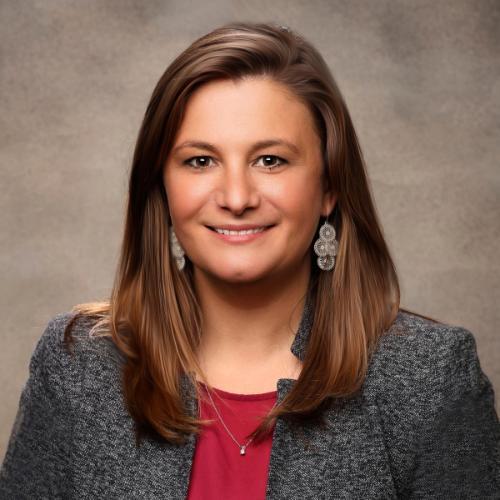Nov 14, 2025
VCU researcher makes the business case for spiritual care in health care

Kelsey White, Ph.D., assistant professor and chaplaincy faculty researcher at VCU’s College of Health Professions, took the stage at the American College of Healthcare Executives (ACHE) Congress of Healthcare Leadership in March. The room in Houston, Texas, was filled with hospital CEOs, COOs and other senior executives whom White and her co-presenters challenged to consider the importance of an often overlooked part of clinical service: spiritual care.
White’s session, “Wicked Problems Call for Spiritual Solutions,” was co-led by Jason Lesandrini, Ph.D., of Wellstar Health System; and Laura McClelland, Ph.D., of the VCU Department of Health Administration. Their session highlighted research showing how spiritual care can positively affect patient experience, workforce well-being and access to care.
“A lot of the work that we presented at ACHE comes out of this desire to really help develop a business model or business case for the inclusion of spiritual care within health systems,” White said. “Caring for the religious and spiritual needs of those seeking care can be so important to making sure a health care organization is successful and performing at its peak ability.”
Their case rests on both data and lived examples. Through a grant from the John Templeton Foundation – which supports research on the intersection of science and spirituality – White and her collaborators conducted a scoping review of 141 empirical studies on chaplaincy interventions in clinical settings and consulted health care executives nationwide.
Their findings demonstrated that chaplains can help address what White calls health care’s “wicked problems”: rising costs, access disparities, staff burnout, inconsistent patient satisfaction and other persistent challenges. For example, over one-fourth of the articles reviewed pointed to spiritual care providers intervening to address clinicians’ stress.
White, who has been a board-certified chaplain since 2013, brings both academic rigor and clinical experience to the table. Her career has taken her through hospices, trauma centers and outpatient clinics, giving her firsthand insight into the difference spiritual care can make for patients, families and care teams. At Congress, she reminded health care leaders that chaplains are not merely “nice to have.”
“I really want health care executives to think about spiritual care providers as a resource and tool to help improve health care ecosystems, rather than just being there to pray for people,” she said. “Chaplains are key to making sure that organizations function with compassion and robust integration.”
Beyond big-picture data, the presentation pointed to concrete examples of how spiritual caregivers step in at pivotal moments. During medical emergencies, for instance, they can partner with clinical teams to provide support for family members, explaining what’s happening, supporting loved ones who may choose to witness a procedure and absorbing the emotional strain so doctors and nurses can remain focused on the patient’s needs. They support various teams, including those in organ procurement and transplantation. Chaplains have been called upon to support nurses and organ procurement organizations, helping to clarify roles and keep the process moving smoothly.
The response in the room, White recalled, was one of energy and curiosity. Executives responded enthusiastically to the real-world examples and asked questions about expanding spiritual care providers’ role.
“We encouraged the audience to have direct conversations with and shadow their chaplains, both to learn how they’re integrated throughout the system and brainstorm about how they can help achieve organizations’ strategic priorities,” she said. “These folks are often more connected and know more about what’s going on in a clinical environment than one would expect.”